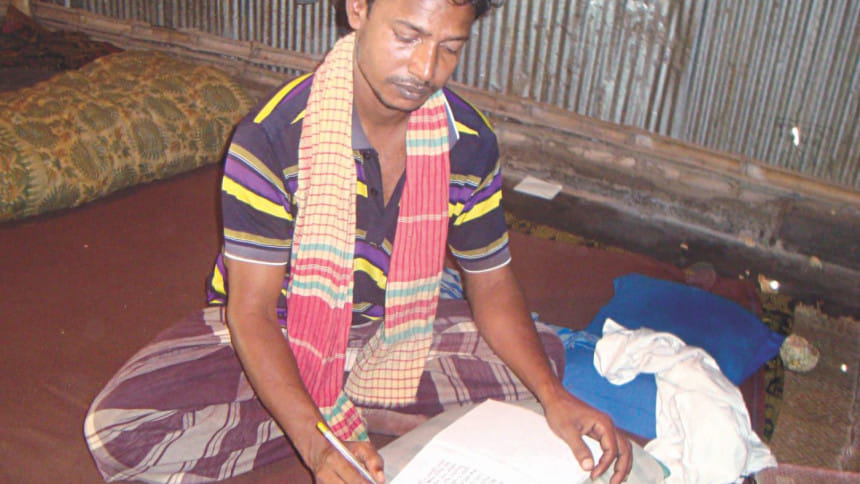Poet at heart

|
Poem: A Clarion CallBy Gulzar Hossain Garib (Translated from Bangla by Mohammad Shafiqul Islam)
Stand up for the country, the welfare of the nation, |
The world of prejudice, constant division and conflict in which we live is enough to confuse. It's easy to feel overwhelmed. To better understand the human predicament, what sort of a world it is that one might dream of, it's as well to turn to a poet.
Through his words, Jhenidah's own 35-year-old labourer poet Garib, whose name means Poor, shares valuable insight into how the world should be. Even the life story of this most unlikely and obstinate of poets may remind us that, despite everything, not much is impossible.
Of a day Gulzar Hossain Garib from Maharipur village in sadar upazila is to be found at Jhenidah truck terminal. He works as a labourer, unloading sand from trucks with his spade.
“Garib is as honest as he is hard-working,” says labourer colleague Masum Ali. “He seeks to prove that profession cannot prevent someone from doing something great. To achieve great things needs untiring labour, honesty and sincerity: all qualities that Garib possesses, though he has no money.”
“He does not spend any time in vain,” says another truck-stop colleague, Swapan Ali. “In his leisure hours Garib composes poems and songs.”
Garib earns Tk 300 per day with which to support his wife and two school-going children, daughter Mitanur in class-VI and son Ikramul in class-IV. The family lives in a rented house in the Paglakanai area of the district town.
Economic hardship has lasted for the whole of Garib's life thus far and he was only able to study to class-IV. But even at that young age he had developed an unquenchable thirst for reading.
“I borrowed books from my older brothers and rich friends,” Garib recalls. “I especially liked the poetry of Kazi Nazrul Islam and Michael Madhusudan Dutta. I read the autobiographies of many poets and great men; I also like novels and songs.”
“Being unable to study due to my family's poverty, I continued to read,” Garib says. “Many people ridiculed me for it, as I am just a labourer,” he says. “But their teasing encouraged me. One English poet says that our antagonist is our helper. That has been the experience of my life.”
“Once I was sitting at a tea stall,” Garib reflects, “and two gentlemen arrived in search of tea. They saw that I was dirty and addressed me as 'labourer', and left the stall without drinking tea. It really upset me. But I think that any man can flourish in life if he is sincere and honest. Any adversity can be overcome.”
Indeed to practice and improve his basic writing skills, Garib took to helping local wives write letters to their husbands working overseas. Since, he has composed around 300 songs, 56 sonnets and 56 poems. He's in the habit of presenting drafts to more educated town dwellers to seek out language mistakes. Thus, over time, his writing has become more refined.
Garib names his mother Marium Nessa as the inspiration behind his written works. “Her contribution is beyond description,” he says. “Once a manuscript of my songs was stolen and I didn't feel like writing anymore. My mother revived my passion, urged me to continue.”
“My ultimate dream is to publish my writings so that my mother can find solace in her encouragement,” he remarks. Already Garib has locally published a pamphlet of his work.
Although at birth his name, Garib, might've seemed an accurate description of his life situation, this poet has proved that money is only one measure of wealth; and it's not only his mother and work colleagues who've noticed.
“Garib is not poor,” says the former principal of Jhenidah's Nurun Nahar women's college Sushendu Bhaumik, “He is rich in mind. He has strong ambition to do something great and I think his sincerity must lead him to success.”

 For all latest news, follow The Daily Star's Google News channel.
For all latest news, follow The Daily Star's Google News channel. 



Comments